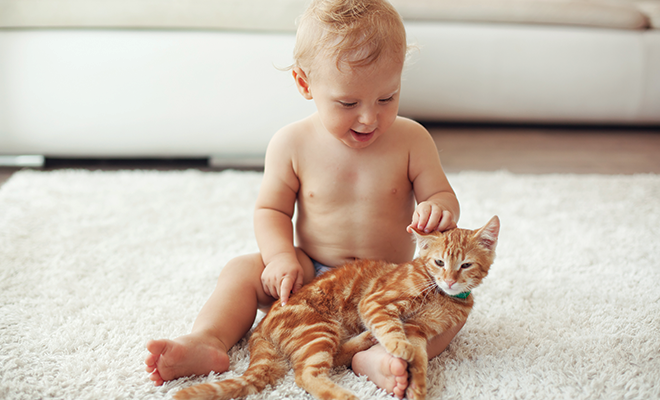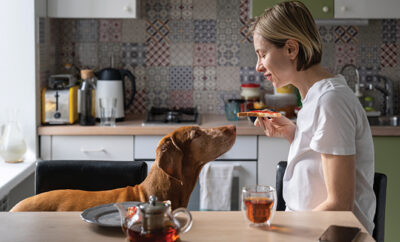
Dispelling the Myths about Cats and Babies
Cats and babies can co-exist harmoniously, however there are some precautions that new or expecting parents should take to help safeguard their precious baby and cat.
Kristyn Savage of Beyond the Dog, LLC, helps us learn more and sheds some light on several myths about cats and babies, plus more information about feline behavior.
Toxoplasmosis
Should you rehome your cat due to the risk of toxoplasmosis, since it can be very serious for a pregnant woman and her unborn baby? Luckily, it can be easily avoided by simply having someone else clean the litter boxes or anywhere a cat soils. “The soon-to-be mama should also avoid gardening unless she’s wearing gloves. To help reduce the spread of toxoplasmosis, litter boxes should be cleaned daily,” says Kristyn.
She also advises that once your baby is born, anyone who cleans the litter box should wear gloves and wash their hands afterwards. “Toxoplasmosis has not been found to be transmissible through breast milk. However, new parents should always speak to their doctor about any concerns.”
Stealing Breath
Kristyn explains one of the biggest myths is that cats “steal” a newborn’s breath. “Cats certainly don’t steal breath, but that doesn’t mean it’s safe for a cat to have access to the sleeping baby. A lounging cat could create the same dangers as a blanket or stuffed animal for a sleeping newborn.”
Parents should consider sleeping arrangements prior to the baby’s birth. “It is not recommended that babies and cats sleep in the same room. A cat could easily suffocate the little one unintentionally. If Kitty typically sleeps with Mom and Dad and the new baby will be in their room, he should get accustomed to sleeping in another room months in advance.”
An alternative sleeping arrangement could be a perch in the main living space. “Investing in a cat tree or creating an elevated shelf or window seat typically makes a comfortable spot to lounge. This will allow him to remain part of the family as well as offer a place to retreat as baby becomes more mobile,” says Kristyn.
Getting Along Together
There’s also a notion that cats don’t make good pets for children. “Cats can make excellent pets for children. They can often be less intimidating for a little one.” Kristyn emphasizes it’s important that cats are not only socialized properly with children, but children should be taught appropriate behavior as well.
Being proactive before your baby arrives can greatly help your cat and baby bond. “Much like a family dog, cats should be prepared for the new bundle of joy slowly and well in advance. Setting up the nursery, putting together larger equipment and playing sounds of babies crying can be done months before the birth.” Kristyn also recommends feeding in the same room as the new equipment but avoiding the nursery. The ASPCA shares a helpful tip, suggesting new parents rub baby lotion on their hands before engaging in a pleasant activity with cats to create positive associations with baby odors.
Reduce Stress
It is equally important to ensure you continue to create an accommodating space for both baby and feline once you are home from the hospital. The ASPCA recommends peacefully greeting your cat in a quiet room without interruption upon arriving home. Once you’ve had a few minutes to reconnect, allow other family members to join you inside your home. Another tip is to place something with your infant’s smell in a quiet area where your cat can investigate it. According to the ASPCA, a crib and other baby sleeping locations should be off limits to your cat. They advise new parents to close the door to the nursery when the baby is napping, noting these safety measures can prevent cats from urinating in the crib, something she may try if extremely stressed.
Kristyn warns that cats can be very sensitive to change. If your cat tends to stress easily, new parents may need to be aware of those signals. Although extra time can be in short supply, maintaining your cat’s normal routine can help reduce additional stress. Be sure your cat has easy access to items she regularly needs such as water and the litter box. These items should be in areas that are easily accessible with clear pathways; don’t place the litter box, food or water in the nursery. Clean the litter box daily, which can help prevent house soiling.
It’s also important for your cat to associate their new family member with positive things, so offering your cat some canned cat food or tuna upon baby’s first arrival home is a great start to a pleasant relationship.
In short, we’ve learned if proper precautions are taken, cats and babies can co-exist happily and form a long-lasting bond for years to come. ■
Sources: aspca.org and beyondthedogtraining.com







